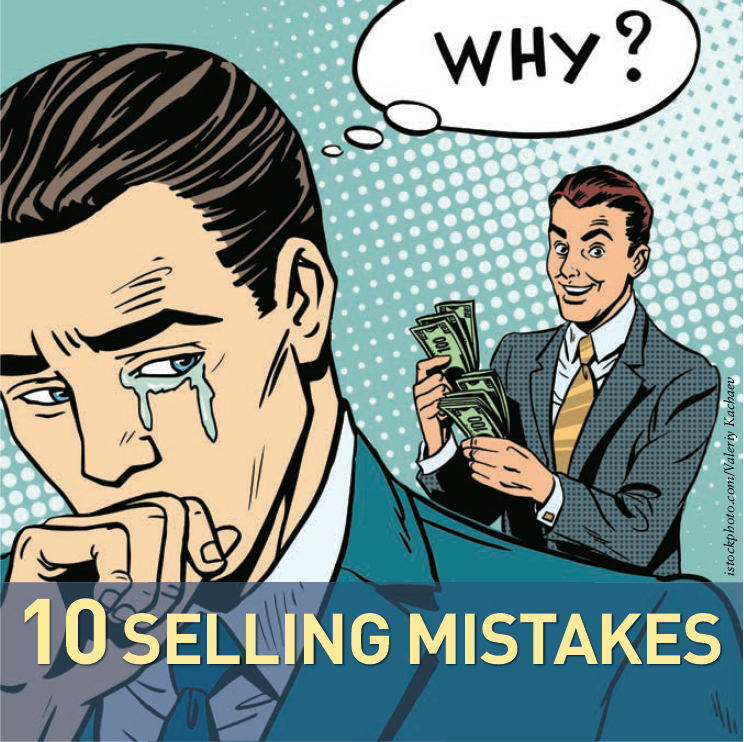On the heels of the article I wrote for the March/April issue of Catersource, in which I discussed the 12 components of sales success, I thought it would be wise to also discuss selling mistakes. In so many ways, they go hand-in-hand. You can find my earlier article online at catersource.com. Let’s dive right in!

1. Not selling you
The moment you engage with someone, they are judging you first, then they are judging what they’re buying, and then finally judging the company they are buying from. They are buying you first, so sell yourself and your qualifications to help them!
2. Not understanding the REAL needs
Stop selling what you think the client needs and find out what their triggers are. What is important to them? When it comes down to it, your product or service may be of lower importance to them. You don’t want to oversell it and not get the job.
3. Lack of connection
When all things are equal, people buy from people they like. Be sure to spend more time connecting in conversation instead of merely focusing on your product. Make friends, build trust, and the rest will come.
4. Not asking the right questions and listening
Questioning is a vital skill in communication. Asking the right questions allows you to gain an insight into the mind of the client. Questions are utilized to explore the feelings, ideas, opinions, and attitudes of your client; to clarify something he or she has said; and to obtain information. When the right questions are asked, you are able to learn more about the client and understand that person better—thus your decision-making process is aided. But note: anyone can ask questions. To be successful at sales you must know how to ask the right questions. More important, however, is to listen carefully versus fixating on the next question you plan to ask.
5. Believing that price is the issue
If one DJ is $1,000 and another is $1,200 and the client doesn’t see the difference between the two companies, they will book with the less expensive company. Wouldn’t you?
6. Not knowing the differences between features and benefits
If I were to ask you about the benefits of using your company I would probably get answers such as, “Our service is amazing. We pay attention to detail. We’ve been in business for XX years. We are creative.”
These are features. A benefit to a client is simply, “what’s in it for me?” How will these features affect them? Chances are your competitors are making very similar statements so the client is immune. You need to turn a feature into a benefit. Tell them why your service is amazing and how it will make their event go more smoothly. Give them an example of your attention to detail. Offer some illustrations of your creativity and how it will make an event something guests have never seen before. Features tell; benefits sell!
7. Body language
Did you know that 55% of all human communication is non-verbal? Non-verbal expressions provide you insight into the attitude of the client. By being attentive to these cues, you can decipher the client’s feelings. Are their arms crossed or are they leaning in to listen to you? All of these non-verbal cues offer a roadmap to your sale.
8. Not identifying the influencers
We all know that it is important to understand who the decision maker is. However, just as important is being aware of the influencer. An influencer is a person who is well connected to your client and who is regarded as significant and in the know; someone who is looked to for advice, direction, knowledge, and opinions. This could be a colleague, boss, friend, bridesmaid, or parent.
9. Weak close
No matter how hard you work, how well you qualify, and regardless of how well you think your meeting with the client went, if you are weak at closing sales, you will suffer in your career. Closing sales involves a calculated process of understanding the client’s needs, showing the client that you have what it takes to fill that need, and ultimately, creating a relationship with the client so that he decides to trust you with the job of filling that need.
10. Assumption
Have you ever met with a client and you instantly connected? You just have the confidence that you will book the event. A week later, the client is not responding to your calls and emails. What happened? You were outsold! Why didn’t you ask for the deposit? It sure doesn’t feel good knowing that your competitor did a better job selling to YOUR client. Be smart. Ask for a deposit to hold the date they are interested in.



